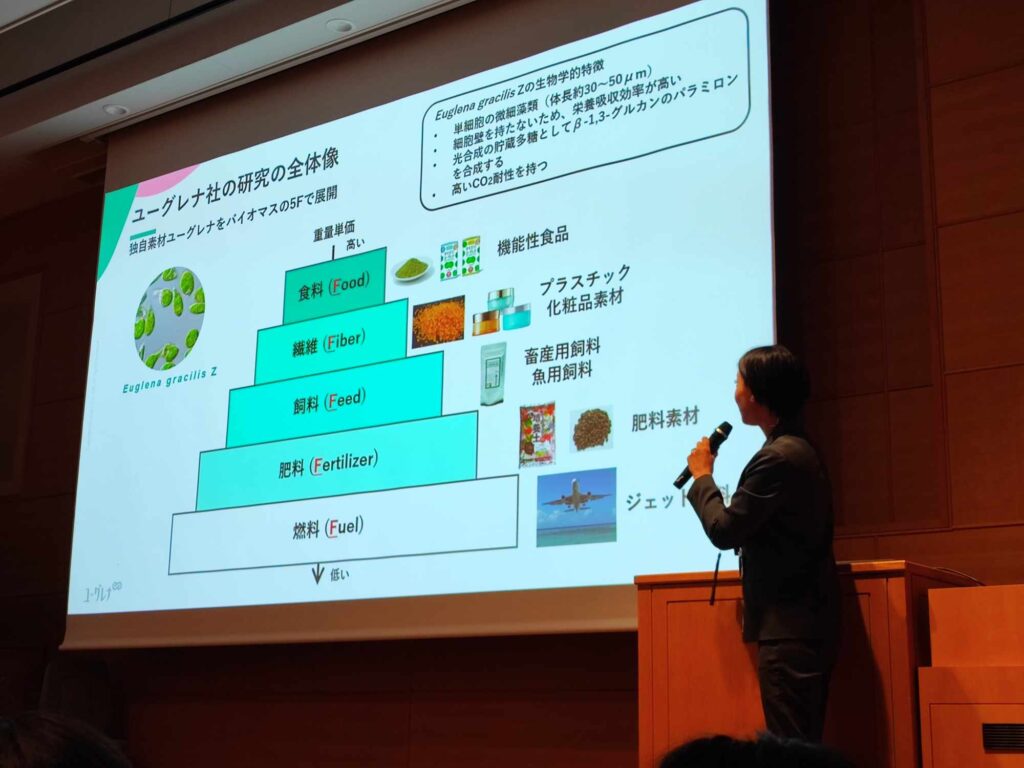
Euglena Co., Ltd.’s Participation in the Euglena Research Conference 2023
Introduction
The 38th Euglena Research Meeting, Euglena2023, was held at Meiji University's Ikuta Campus on November 11, 2023 (Saturday). The event, chaired by Professor Takashi Osanai of Meiji University, began at 1:30 PM and concluded at 8:00 PM. The venue was conveniently located a 5-10 minute walk from Ikuta Station on the Odakyu Odawara Line.
Symposium Organized by Suzuki and Toyokawa of Euglena Co.
A highlight of the conference was the symposium organized by Suzuki and Toyokawa from Euglena Co. The session featured presentations on genome editing, oil production, bioplastic utilization, and applications in space. These discussions underscored the versatility of Euglena and its potential in addressing environmental and energy challenges.
1. Development of Carbon Fixation and Utilization Techniques Using Euglena
Dr. Keiichi Mochida from RIKEN led a session on enhancing the productivity of Euglena, particularly in using atmospheric CO2. The presentation highlighted advancements in genome editing techniques for Euglena gracilis, using CRISPR/Cas9-based electroporation, achieving over 80% efficiency in creating modified strains. These innovations pave the way for addressing societal challenges through joint research, both domestically and internationally, including CO2 fixation projects with Indonesian universities and power plants.
2. Sustainable Living in Space with Euglena gracilis
Dr. Chihana Toyokawa from Euglena Co. discussed utilizing Euglena gracilis for sustainable food production in space. The research focuses on recycling resources, such as converting human urine into nutrients for Euglena, and transforming CO2 into oxygen through photosynthesis. A mini-cultivation module has been developed for cultivating Euglena in space, marking a significant step towards sustainable space exploration.
3. Hydrocarbon Fuel Production from Microalgal Oils
Dr. Iori Shimada from Shinshu University presented on converting microalgal oils into hydrocarbon fuels, emphasizing the importance of deoxygenation in this process. The research explored various plant oils and microalgal triglycerides and wax esters as raw materials, using UUSY-type zeolite catalysts in the RRFCC process. The findings suggest potential for efficient fuel and chemical production from oils, contributing to sustainable energy solutions.
4. Collaborative Efforts in Biomass Plastic Utilization: The Case of Euglena
Dr. Tadahisa Iwata from the University of Tokyo highlighted the development of high-performance biomass plastics using polysaccharides, with a focus on paramylon derived from Euglena. The study synthesized paramylon ester derivatives, demonstrating their suitability for injection molding and melt-spun fibers, and their potential for biodegradability. The establishment of the "Paramylon Japan Consortium" in March 2021 exemplifies the successful industry-academic collaboration aimed at promoting the practical application of biomass plastics.

Poster Session and Networking
The poster session provided an interactive platform for researchers to present their work and engage in detailed discussions. The networking event facilitated exchanges between different generations and fields of researchers, fostering collaborations and sharing of diverse perspectives.
Conclusion
The Euglena Research Conference 2023 proved to be an exceptionally valuable platform for advancing knowledge and fostering collaboration in the field of microalgae research. The diverse range of topics discussed, from genome editing and sustainable oil production to innovative applications in bioplastics and space exploration, highlighted the multifaceted potential of microalgae. The successful integration of panels, discussions, and poster sessions facilitated a deep exchange of ideas among researchers from various backgrounds, driving forward both academic and practical advancements. This conference not only underscored the importance of microalgae in addressing contemporary challenges but also set a precedent for future interdisciplinary and collaborative research efforts.
